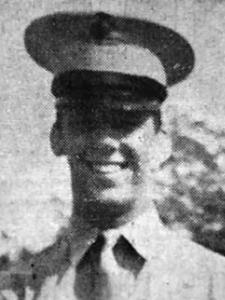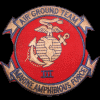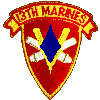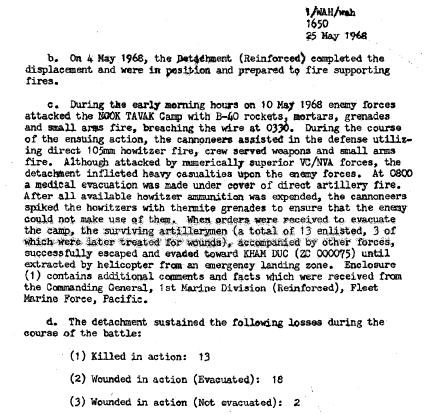| |
|
|
|
Joseph Francis Cook
Lance Corporal
D BTRY, 2ND BN, 13TH MARINES, 1ST MARDIV, III MAF United States Marine Corps Foxboro, Massachusetts January 15, 1949 to May 10, 1968 JOSEPH F COOK is on the Wall at Panel 58E, Line 5 See the full profile or name rubbing for Joseph Cook |
 |

|



| |
Joseph is my "adopted" MIA.
Courage is the price that life exacts for granting peace.
|
|
We served together in Hawaii and Vietnam. We came back for you, CZ, and all the others in 1995. You will never be forgotten! Aloha, Bro!
Tim Brown, |
|
From the Sun Chronicle newspaper, 10 August 2005:
Welcome home, Lance Cpl. Cook. Rest in peace.
From someone who grew up in Foxboro and who has thought about our lost veterans over the years. |
|
Welcome Home.
From a fellow vet, |
|
My prayers were answered, they found you. It took 37 long years but today August 10th I woke up to sad but good news - you are coming home. I too have your bracelet. Semper Fi, Marine, you will still not be forgotten. You will always be in my mind, thoughts and prayers. I wish that I could see a picture of you.
Thank you!
25 Dec 2005 Just thinking of you as always. Merry Christmas, Joe!
Joan Petersen
15 Jan 2006 Happy Birthday, Joe!!!! Just letting you know that I am thinking about you on your birthday.
Joan
Joan Petersen 260 Raynor Ave, Whitman, Ma. 02382 sgtmajpetersen@comcast.net |
|
You are coming home my friend! Never forgotten, always in our hearts.
Martha Pulrang
24 Sep 2005 My friend, you were laid to rest today between your parents. I am sure they were waiting still for your arrival home. So many tears fell, from young and old, women and men, those who knew you and those who did not. But all were together today to welcome you home. I know you walked the streets they carried you down today before you left. And those streets were lined today with people thanking you and remembering you. Rest now, you are home. I will visit you frequently, my friend. I will never forget. Semper Fi!
Martha Pulrang |
|
It is with a sense of sorrow mixed with joy that I welcome Joseph Cook back to the world, may he finally rest in peace along with his fellow Marine Paul Czerwonka of Stoughton, MA, whose remains have also been returned from Vietnam for interment.
A concerned citizen of the |
|
Joe Cook
From a friend, |
|
Joseph F. Cook will be buried September 24, 2005 in Foxboro. All 2/13 Marines should report in at two13marines@yahoo.com The remaining Delta 2/13 MIAs will be buried October 7th at Arlington. Gone but not forgotten. No Marine truly dies until he is forgotten. 2/13 Marines won't forget their buddies who died May 10, 1968.
From a 2/13 Marine. |
|
From |
|
Welcome Home, Marine.
From another Vet |
|
God Bless this Marine.
From a fellow Marine, Class of "84", |
|
Joseph F. Cook, I feel as though I know you. You and my father were best friends as children, and went into the Marine Corps together. Growing up I heard many stories about the wonderful person you were. My father and I would go to the Wall and trace your name with a crayon, all the while crying. I remember the day that my father was told that your body would be coming home. I never knew you, but I love you. You are a part of my family, and a part of my heart. Please rest in peace, and know that you will always be in my thoughts.
Amanda S. Yeram |
A Note from The Virtual WallIn the spring of 1968 the North Vietnamese Army's 2nd Division was enroute to South Vietnam, moving down the Ho Chi Minh trail in Laos. By early May, the division's advance regiments - the 1st and 2nd Regiments - had entered South Vietnam using the French-built Route 14 which passed by the old French fort at Ngok Tavak. The NVA commanders decided that Ngok Tavak and the main Special Forces camp at Kham Duc had to go.Beginning at about 0300 on 10 May 1968, Ngok Tavak came under heavy attack by a North Vietnamese Army infantry battalion, an element of the 2nd NVA Regiment. In a pitched battle, the small force of defenders staved off immediate defeat, but by noon on 10 May it was clear that Ngok Tavak would have to be abandoned. Surrounded on three sides by the 2nd NVA Regiment, it was clear the withdrawal would have to be by foot moving to the north - the attacking force had made a helicopter evacuation impossible. After destroying equipment and supplies which could not be carried out, the survivors began the move to the main camp at Kham Duc, proceeding along a lane flanked by near-continuous air strikes. They were picked up by helicopter midway to Kham Duc, arriving at the camp at about 2100 (9 PM) on 10 May. The defending force at Ngok Tavak had incurred numerous losses in both known dead and missing soldiers and Marines:
In a sense, the survivors of Ngok Tavok jumped from the frying pan into the fire - Kham Duc itself was under heavy attack. What happened next is covered on The Virtual Wall's
Kham Duc memorial.
The following text is exerpted from the 2nd Bn, 13th Marines' Command Chronology for May 1968; it addresses the D Battery detachment sent to Ngok Tavak:

Several pages further on is a list of the 43 Marines and one Navy Corpsman in the detachment; of the 44, 13 were dead (11 not recovered); 18 wounded had been medevaced by helo; and 13 moved out by ground with the other survivors. The detachment was recommended for a Meritorious Unit Citation; a portion of the text notes that "During the helicopter evacuation, members of the Detachment voluntarily remained on the ground to provide security until the rest of the survivors had been extracted and the last helo was ready to depart."
|
| Contact Us | © Copyright 1997-2019 www.VirtualWall.org, Ltd ®(TM) | Last update 08/15/2019. |